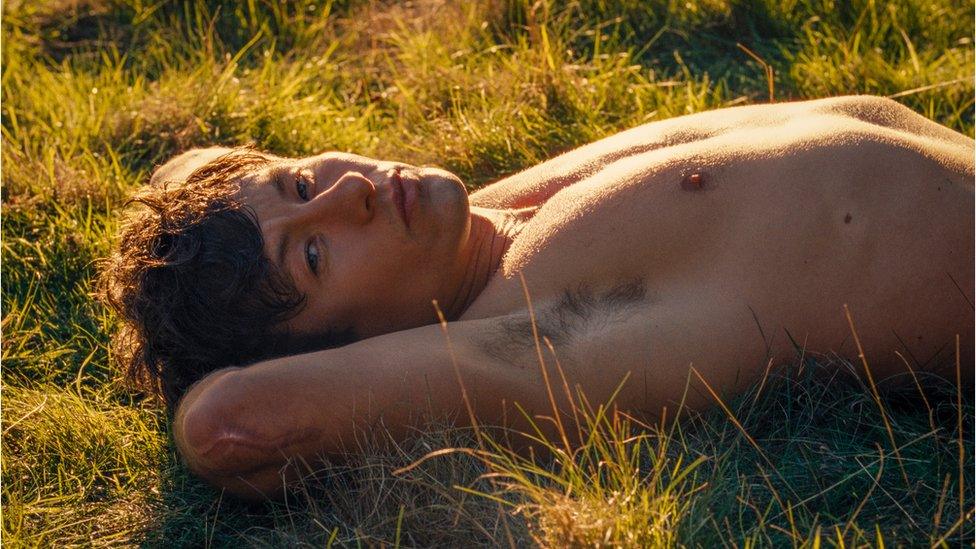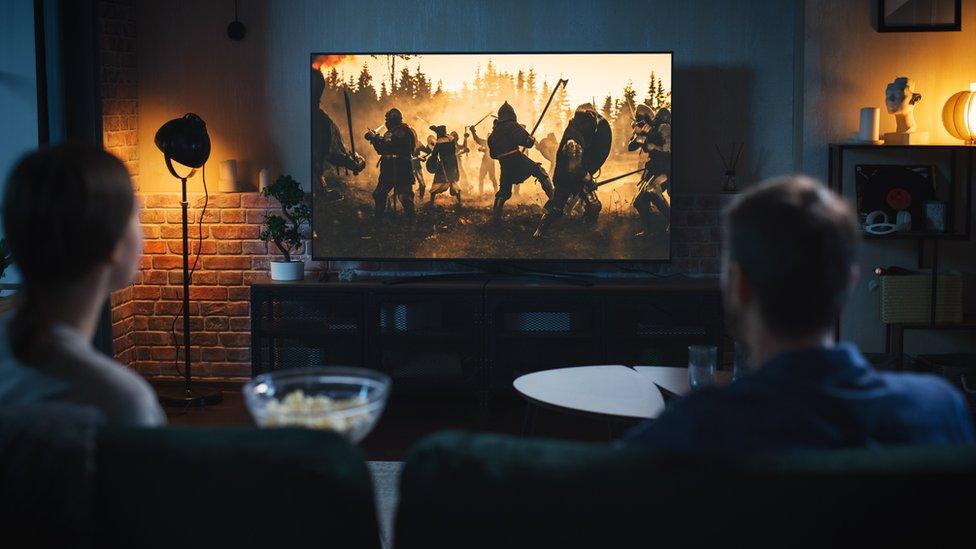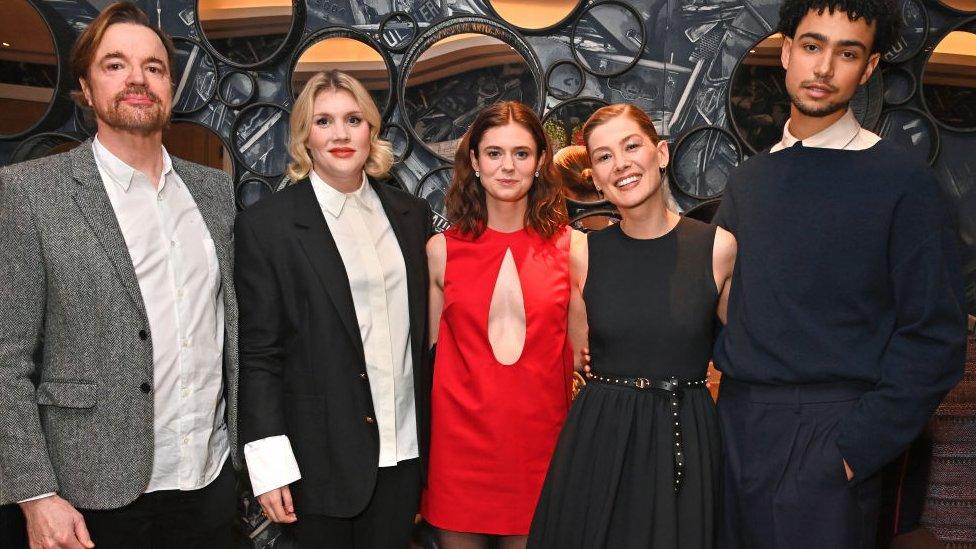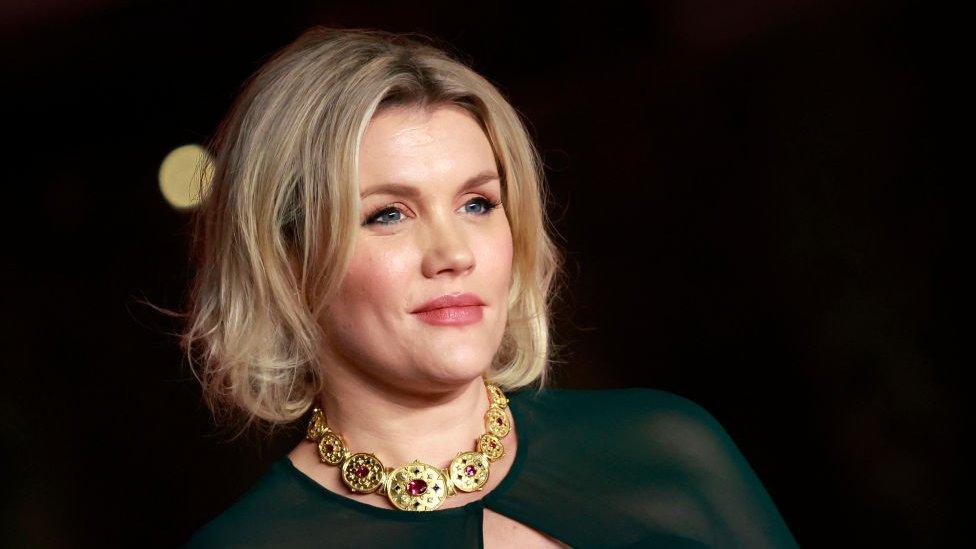Will TikTok take Saltburn from bathtubs to Baftas?
- Published

Barry Keoghan's explicit scenes as Oliver sparked a frenzied reaction on social media
Saltburn has been a slow-burn success story of awards season, having far more impact on streaming than it did in cinemas. Gross-out scenes involving bathtubs and graveyards helped it go viral, ultimately scoring it five nominations at this Sunday's Bafta Film Awards.
Over the past few weeks, home film viewing took a spicier turn for many.
Alongside the usual festive favourites, those slumped on the sofa could also pick from director Emerald Fennell's latest feature, Saltburn.
A modern ode to Brideshead Revisited and The Talented Mr. Ripley, it sees Barry Keoghan star as Oliver, an Oxford student who becomes depravedly transfixed by his wealthy friend Felix, played by Jacob Elordi.
The not-so-family-friendly thriller arrived on Amazon Prime days before Christmas, just in time to heat up living rooms: its salacious scenes leaving viewers recoiling red-faced and unsuspecting in-laws squirming - neither set to look at bathtubs, nor perhaps cranberry sauce, in quite the same way.
Despite a limited cinema release a month prior, it was only when released on streaming that Saltburn really caught fire.
According to Amazon, viewership nearly quadrupled in the month following the film's opening weekend on the streaming platform.

Jacob Elordi, left, and Barry Keoghan have both seen their profiles shoot up
Social media fanned the flames, with Saltburn-themed videos racking up over 4bn views on TikTok alone by the New Year.
Fan recreations of Keoghan's bare-all closing dance scene, set to Sophie Ellis-Bextor's 2001 hit Murder on the Dancefloor, duly helped the song fly back into the UK top 10.
This online hunger, assured by Elordi bath bombs and candles hitting the internet, external, turned Saltburn into "a bona fide viral hit" wrote Alissa Wilkinson in The New York Times, external.
The film has maintained an "outsized amount of attention" Wilkinson added. "People keep talking about it".
Saltburn's unconventional route to awards season reflects changing viewing habits and a film industry in flux.
No-strings convenience?
In some ways, Saltburn's gossipy mass appeal seems obvious.
Elordi, enjoying his breakthrough Hollywood year, previously captured Gen Z hearts in the envelope-pushing Euphoria. Keoghan meanwhile, is a recent Oscar nominee for The Banshees of Inisherin.
Throw in the lustful script full of shock and decadence, mixed with a shameless dollop of 00s millennial nostalgia, and all bases appear covered.
But why then did the film only truly find its audience on streaming?
Allow YouTube content?
This article contains content provided by Google YouTube. We ask for your permission before anything is loaded, as they may be using cookies and other technologies. You may want to read Google’s cookie policy, external and privacy policy, external before accepting. To view this content choose ‘accept and continue’.
The answer lies partly in cost and convenience.
Casey Kelleher, an author and Prime subscriber from London, first came across Saltburn through the viral TikToks of shocked reactions to the controversial scenes.
She says that whilst she loves movie-going, watching from home through her Amazon subscription "did feel like the cheaper option than going to the cinema", especially given the current cost-of-living crisis.
Laura Cruise, a life coach from Bedford, faced a slightly different problem.
"My daughter and I wanted to see Saltburn at the cinema but our local only had a teeny tiny number of showings for it, all of which were fully booked," she explains.
"We ended up watching it around Boxing Day on a post-Christmas sofa day".

At home streaming began to dominate during Covid lockdowns
Laura's experience in being left little choice but to stream the film is no accident on the part of Amazon, who co-produced the project with MGM.
This investment assured that, once the film met theatre screening requirements for awards season eligibility, it would stream exclusively on Amazon Prime, making it a starry vehicle to push subscriptions.
Saltburn's shortened theatrical release window underpinned this - particularly as the film performed well in its theatre showings.
Global box office takings topped £20m according to Amazon - a respectable return given its relatively short run. It also took just over £5m domestically in the UK, out-performing recent awards season films of a similar ilk such as The Menu and Babylon, Gower Street analytics tell the BBC.
Saltburn's example also reflects increasing experimentation with traditional release strategies, upended during the pandemic.
This is especially true for streamer awards season contenders says Dade Hayes, business writer at Deadline and co-author of Binge Times.

Director Emerald Fennell, centre left, intended Saltburn for theatres, but the film became a hit on streaming
"With awards titles like the Oscar-nominated Maestro on Netflix, the company gives films splashy premieres at festivals and pulls out a lot of promotional stops," he explains.
"But ultimately the pattern winds up being a version of Saltburn - a short stint in theaters, generally 2 to 4 weeks, followed by a high-profile arrival on streaming as 'free' titles."
And this current strategy may change further as streamers face an unsteady future.
Fuelled by a tech giant gold rush from Silicon Valley, the past decade saw rapid growth in high-debt TV and film projects, drawing a billion subscribers to services by 2020 - growing as Covid lockdowns hit, external.
But life behind the screen suggests corrosion beneath the gloss, argued Stephen Armstrong in The Financial Times last year, external.
He says the "tech-industry playbook" delivered big programme budgets but less investment in "the basics of programme making".
When subscriber numbers temporarily stalled in 2022, streaming giants switched from chasing sign-ups to pursuing profitability. Writers, doing more for less, ended up on strike, eventually securing better terms.
The knock-on effect means best practice for successfully shepherding a film towards awards season has "never seemed less certain" says Hayes.
"The industry over-corrected during the pandemic and did damage to its long-lucrative theatrical model."
Audiences 'now star and direct'
Audience habits have shifted in response, with cinema box office returns still materially down 30% compared to pre-pandemic levels, according to Tom Harrington from Enders Analysis.
Add marketing costs on top of this, he says, and there is "often very little point in studios releasing anything other than the biggest films in the traditional full theatrical sense".
This vicious circle sparks sequels and reboots, leaving little theatre space for "traditional art-house movies" like Saltburn, instead left to find an audience on streaming says media commentator Ian Whittaker.
Netflix has even suggested it plans to give up on theatre releases entirely, external.
The impact of the shifting landscape runs deep, even affecting Saltburn's director Emerald Fennell. Writing in the LA Times, external, she spoke of wanting to create an "uncomfortable experience… to be watched in a dark room with strangers" made for the "specific, disquieting intimacy of the [movie] theatre".
But post-pandemic, viewers chose a different script by streaming from home. This audience power continues to grow thanks to user-generated social media, which became the nerve-centre of Saltburn's blistering virality.

Barbie's marketing campaign was eye-watering - and hugely successful - with debut takings worldwide of $337m (£293m)
Last summer's Barbenheimer phenomenon highlighted the increasing influence online audience reactions hold on cultural currency.
Films now develop distinct digital identities through audience projection. This can be marketed or entirely organic, as Wes Anderson found when users playfully began recreating the visual aesthetics in his movies. Never is it assured.
In the case of Saltburn, those explicit scenes became the talking point for some, while for others it was the recreation of the closing dance scene, visiting Saltburn castle or watching Felix-style rich kids having a chance to flaunt their homes.
The ballooning online chatter drew attention away from criticisms, particularly around its handling of class. The film, its score, Keoghan, Elordi and co-star Pike are all up for Baftas, but faced an Oscars snub, with The Guardian calling it one of the most "divisive" films of the year, external, running purely on "vibes".
But whilst online virality provides a thrilling publicity burst, it is not necessarily the golden bullet for the industry. Artistically there's a danger that messages within films can get lost in the buzz, commercially it generates nowhere near the security of sold out-theatres.
This is of little concern for Gen Z audiences, who view the streaming-social media relationship as the norm. "Streaming is now their primary way of watching long-form," Vera Chien, Warner Bros. Discovery's executive director, told Forbes, external.
Hollywood has begun attempts to bridge this gap, using short-form video to push to the big screen. Last year Paramount celebrated "Mean Girls Day" on 3 October by releasing the original film in 23 parts on TikTok, external for one day only, in part to prime the audience for its remake, which topped the box office last month.

Saltburn's revival of Murder on the Dancefloor saw Sophie Ellis-Bextor perform the song on Jimmy Fallon's US TV show this week
The online world is even beginning to seep offline into awards season. Ellis-Bextor is to open this year's Bafta ceremony with Murder on the Dancefloor. It is easy to imagine the camera cutting to Keoghan. A nudge, a wink. None of it planned by the industry.
The audience is now star and director.
The Bafta Film Awards take place on Sunday.
Related topics
- Published18 January 2024

- Published18 January 2024

- Published9 January 2024
